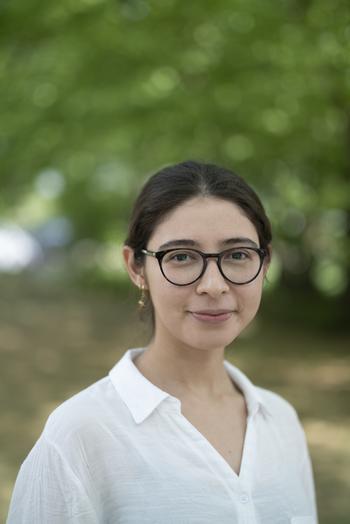Alina Margarita Horta Méndez

International Research Training Group 'Temporalities of Future in Latin America'
PhD Candidate
History of Education
Project: "On the Threshold of Development. Transnational Aspiration Dynamics in UNESCO’s Fundamental Education Programme in Latin America and the Caribbean (ca. 1946–1962)"
14195 Berlin
Education
|
Since 05/2025 |
PhD Candidate, International Research Training Group ‘Temporalities of Future’ |
|
09/2020 – 05/2023 |
Master of Sciences, Specialisation in Educational Research, Center for Research and Advanced Studies of the National Polytechnic Institute (Cinvestav), Mexico |
|
09/2013 – 10/2019 |
Bachelor in Social Anthropology, Autonomous University of Yucatan, Mexico |
Work Experience
|
Since 05/2025 |
Researcher, International Research Training Group ‘Temporalities of Future’ |
|
04/2023 – 02/2025 |
Tutor, International Diploma in Anthropological Theories in Latin America and the Caribbean (DITALC), Alberto Hurtado University, Santiago de Chile |
|
08/2024 – 12/2024 |
Instructor, Social Anthropology Bachelor’s Programme, Autonomous University of Yucatan, Mexico and Instructor and academic coordinator of the course “Latin American Anthropologies. Approaches to their diversity” for Master in Latin American Anthropologies, Alberto Hurtado University, Santiago de Chile. |
|
03/2023 – 07/2024 |
Instructor and member of the coordinating team of exchange academic programs in the humanities at the Institute for Study Abroad in Merida, Mexico |
|
2019 – 2024 |
Co-coordinator of the working group “Anthropology of Latin American Anthropologies”, Latin American Anthropological Association (ALA) with Dr. Esteban Krotz (UADY, Merida) and Dra. Alejandra Letona (USAC, Guatemala). |
| 09/2014 – 11/2017 |
Research assistant, Dr. Esteban Krotz, National Researchers System (SNI), CONACyT, Mérida. Projects: “Anthropology of Latin American Anthropologies” and “Characterization of Latin American utopic texts and social movements” |
PhD-Project: "On the Threshold of Development. Transnational Aspiration Dynamics in UNESCO’s Fundamental Education Programme in Latin America and the Caribbean (ca. 1946–1962)"
Supervisor: Prof. Dr. Marcelo Caruso, Humboldt-Universität zu Berlin
In the mid-1940s, the newly constituted UNESCO crafted and promoted a programme known as fundamental education, targeting populations perceived as underprivileged and backward in different regions of the world. The declared goal was to provide them with the “minimum tools” that would enable them to improve their living conditions through their own means, using the cultural and natural elements of their environment. This proposal was one of the first to link education and development within a truly global framework, as it emerged from an amalgamation of colonial, rural, and mass educational experiences. As such, it involved multiple actors with diverse—and often contradictory—trajectories and perspectives regarding how social change should be directed toward a better and more desirable future in the post-war context. This research aims to characterize the dynamics of aspiration that converged in this programme, based on the analysis of sources from UNESCO, the Regional Centre for Fundamental Education in Latin America (CREFAL), and other institutions that collaborated with the organization. It focuses on the period from the programme’s establishment until the early 1960s, when its funding ceased altogether. In addition to exploring how related projects took shape in regions of Latin America and the Caribbean deemed viable by UNESCO, the work will identify the actors who participated in their various dimensions and problematize the ideas of future that were projected into them, based on their disciplinary and professional trajectories. The research will engage with historiographical perspectives on colonialism, development, and education in its transnational scope to argue that the fundamental education programme stood at the threshold of multiple and diverse ways of conceiving a desired future during the post-war period and at the dawn of the so-called Cold War. In doing so, it will highlight those aspirations that became hegemonic and those that fell by the wayside.
Articles
Horta, Alina (in press). "La UNESCO y la educación fundamental. Un umbral entre distintas concepciones de cambio social en la posguerra”, Historia y Memoria de la Educación (Universidad Nacional de Educación a Distancia, España).
Horta, Alina/Martínez, Yasser (2024). "Lenguaje de estado e historia de la educación. Dos ejercicios de desplazamiento en la mirada a los libros de textos gratuitos y la educación fundamental como objetos de estudio", Anuario Mexicano de Historia de la Educación 4(1), 19–29.
Horta, Alina/Krotz, Esteban/Letona, Alejandra (2023). "Antropologías latinoamericanas. Umbrales y antecedentes", Boletín de Antropología 38(66), 11–14 (=Dossier especial del Grupo de Trabajo "Antropología de las antropologías latinoamericanas" de la Asociación Latinoamericana de Antropología).
Chapters
Horta, Alina/Roldán-Vera, Eugenia (2022). "La educación fundamental y la UNESCO. Disputas transnacionales y experiencias educativas en torno a un concepto (1946–1961)", A. Ferreira Neto/J. Sooma Silva/D. Martins Cassani (eds.), Histórias da educacão na Ibéria e na América. Fontes, experiencias e circulacão de saberes, Curitiba: Appris, 119–137.


